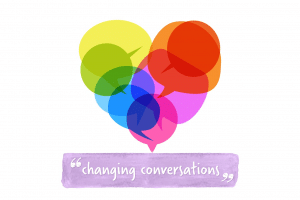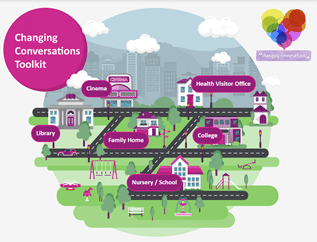31st March 2021
In support of World Autism Awareness Week (29 March – 4 April 2021), a Voices blog by Victoria Jackson, Projector Coordinator at iHV, providing a timely update on iHV’s project – “Changing Conversations about autism”.

All children deserve the best start in life, with no child left behind. We have been delighted that, with support from the Burdett Trust for Nursing, we have been able to explore ways to improve health visitors’ support for families who have children with autism. Over the last few months, we have launched a suite of resources, training and a digital toolkit aimed at “Changing Conversations around autism”.
Co-production has been at the heart of this work. The first step in the development of our resources was to gain an understanding of health visitors’ knowledge, skills and confidence when working in this area of practice – what training they have received and what they felt would support their practice.
Getting it right for families was our overarching goal and we involved families with “lived-experience” of autism throughout every stage of this project. With their involvement, we were able to get a much clearer picture of their views on the support they had received from health visitors and what they felt would help them most. To achieve this, we carried out a national survey which health visitors and members of their teams answered, and a parent/ carer survey which was developed in partnership with the charity KIDS who disseminated this nationally to parents and carers. Key themes from the surveys were then explored further and refined through 4 focus groups with parents and health visitors.
The results from both surveys and focus groups highlighted a clear need for training and resources in this area, from both the health visitors’ perspective and the parents and carers. Health visitors reported that they had limited specific training, with many reporting a lack of confidence in working with families where a child may have autism. From the parents’ perspective, the overarching message from their feedback was that they wanted to be listened to and supported – having a child with autism can be a lonely and confusing journey, and getting the right support made all the difference.
Our next step was to consider how we addressed these gaps in practice. We shared the findings from the scoping exercise during a co-production workshop in London attended by parents, health visitors, SLT, OTs, autism charities and autism experts. By working collaboratively, we were able to really drill down into the themes and explore the health visiting best practice needed to support all parents/ carers to give their child the best start in life. The key message that emerged from the workshop was not the need for specialist knowledge and training, or specific parenting programmes for autistic children. No, the most important thing that parents wanted, and needed, was to be listened to and believed, not to be judged, and to be given hope that the future could be bright.
This very quickly became the centre of the project “Changing Conversations.” What we say, and how we say it, really matters. We heard examples from both parents and professionals of the impact on them when autism was talked about negatively – as a deficit and without hope; assessment focusing on what a child can’t do and not what they can do, and being told that their child will never develop to lead fulfilled independent lives. So, armed with this, and the specific areas that health visitors said they wanted more information on, we set about developing a digital toolkit and training. Then COVID-19 hit……
We had to very quickly change how we worked. Our planned September National training events and co-design workshops needed to be redesigned. We had to think about ways to develop training which was easy to cascade. How could we do this virtually and keep everyone engaged? We were worried that it might be “flat” and lack engagement if we weren’t able to meet in a room to co-create the resources.
The steering group and co-design groups ran virtually via Zoom. Using breakout rooms and interactive sessions, we were able to develop the concept of the map for the digital toolkit which reflects the different parts of a child’s life and the health visitor’s role. We were also reminded that it takes a village to raise a child, and this can’t be done in isolation. The toolkit therefore contains buildings that you may find in a small town or village.

Image of Changing Conversations Toolkit
Throughout the digital toolkit you will see the logo of a heart made-up of multi-coloured speech bubbles and the phrase “Changing Conversations”. Changing Conversations is the central the focus of the digital toolkit and training – having conversations in positive ways, celebrating all children and families, and focusing on what to expect, and all with an affirming message that life may be different, but it can be full of positivity and hope. Parents shaped the resources to represent the things that mattered most to them. The multi-coloured speech bubbles represent the spectrum of needs, abilities, and experiences of children with autism and their families. The heart again brings it back to being positive about autism, shifting away from negative messages and stereotypes, and instead representing the reality that their children with autism are loved and bring love into the lives of those around them.
As we shaped the digital toolkit, we carefully considered what to put in it. What can we do if we can’t leave our houses? That’s where the skills and expertise of the development company Onclick helped create the digital toolkit for us. They made the A-Z of useful organisations interactive – information can be easily accessed by clicking a button to access the websites.
Parents shared their stories which powerfully help us all learn and challenge any outdated views on autism. These can be found in the digital toolkit Cinema, along with a Zoom recording of 11-year-old Logan, who describes his personal story of being autistic through writing and performing poems about his life.
We collaborated with parents, health visitors, charities, digital companies and subject experts, to share this project and all the fabulous resources with you through the brave new world of Zoom events. We held 3 events in November 2020 which reached every part of the UK through the flexibility of the virtual medium. We also recorded our expert speaker talks so that, even if they couldn’t make a session, their talk could be shown. And although we missed the networking around the coffee and biscuit table, the Zoom breakout rooms helped us interact with opportunities for some great discussions and information sharing.
We are delighted with the feedback from these sessions and how well they were received. In fact, they were so popular that we decided to put on an additional event in January 2021 to enable more practitioners to attend. Through these four sessions, we have created Changing Conversations Ambassadors across the UK who will now cascade a 1-hour session to their teams, which in turn gives them access to the digital toolkit. This has proved a very successful model with the new Changing Conversations Ambassadors sharing the resources widely to hopefully make a real difference to families.
So, what next? The project has finished, and the funding has come to an end. At the iHV we don’t want this to be the end, we want to continue to develop resources in this area and keep the current resources up to date. You have told us that you want more information on the sensory needs of children with autism, how to support parents with autism, how to manage sleep/meltdowns, and how can this be expanded to Early Years workers. To get the next phase of this work started, we held a Stakeholder event with all those involved in the development of the project (National charities, NHS England, HEE and PHE) to raise the profile of the health visitors’ role in supporting families with autistic children and why it is important to invest in the Early Years. Keep an eye out for what is going on in this area and what we are doing next. Seek out your local Changing Conversations Ambassador and, as always, if you want to know more, contact us at [email protected].






